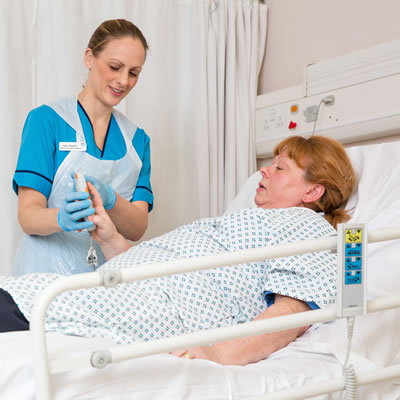
© Crown copyright 2009
You can be reassured that everything possible will be done to take care of your physical needs and to make you as comfortable as possible.
- Managing breathlessness: Being breathless is not related to a lack of oxygen. You may get relief by using a fan to get a cool breeze over your face. Nebulisers may be used to deliver some medicines. If your blood oxygen level does drop you may be given oxygen. If you need help to breathe you may need Non Invasive Ventilation. This is a way of helping you breathe using a firmly fitting face mask which gently assists you to take a breath while allowing your chest muscles to rest. As you breathe in you will feel a flow of air from the machine. As you breathe out you will feel a little resistance to help keep your airways open. You will also notice some noise from the machine which is normal. (NIV is not the same as artificial ventilation you have during an operation where a tube in placed in your windpipe).
- Pain relief: This can be given as pills or liquid or skin patches; if you cannot take medication by mouth an injection or a syringe pump (syringe driver) can be used. A syringe pump has the advantage of giving continual pain relief.
- Chest clearance: If you have difficulty coughing up mucous or phlegm, and it is making you uncomfortable, you will be give help to clear your airways. A specialist physiotherapist can help you with a variety of breathing techniques. If you are very tired they may use suction, which requires less effort from you. there are also some medicines which can help to dry up excess mucous.
- Mouth care: A dry mouth and nose can be uncomfortable. Helping you to stay hydrated will help. This can be done by helping you to drink, or by giving you fluids through a vein. Small sponges and mouthwash will also help if you cannot drink much.
- Eating: Supplement drinks and nourishing, easy to digest meals can be provided.
- Personal hygiene: Staff will attend to this to help your comfort and dignity.
- Bowel and bladder care: Pain medication, dehydration and lack of activity all contribute to developing constipation. Treatments and medications can be given for comfort. Occasionally bladder catheters are used to keep you dry.
- Positioning: This is for comfort and to allow you to be active or to help you rest. Skin can be fragile and you may require a special mattress on your bed.
You have choices about all of these. Care will always be given and if you have capacity to make decisions you will be asked. Family and close friends will be asked if you do not have capacity or if you are unable to communicate your wishes.





